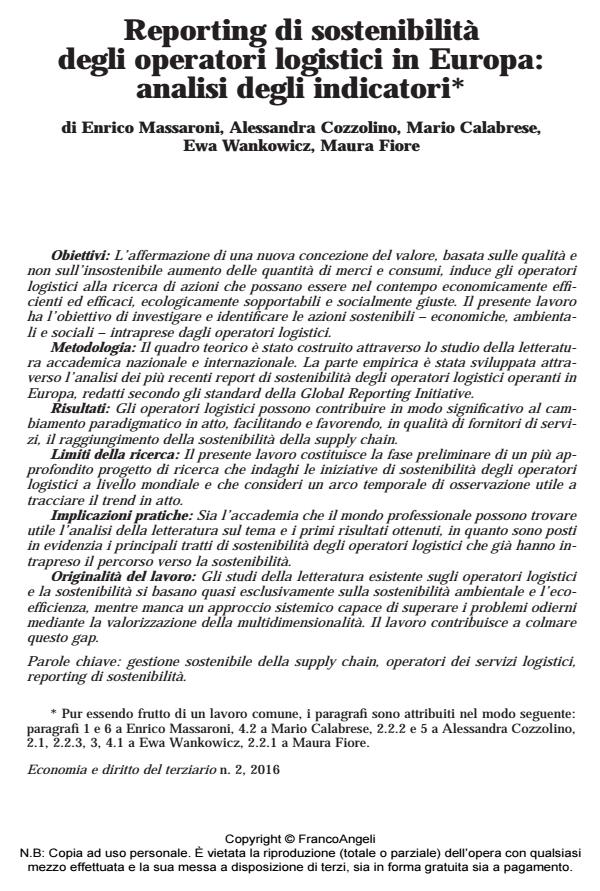Reporting di sostenibilità degli operatori logistici in Europa: analisi degli indicatori
Titolo Rivista ECONOMIA E DIRITTO DEL TERZIARIO
Autori/Curatori Enrico Massaroni, Alessandra Cozzolino, Mario Calabrese, Ewa Wankowicz, Maura Fiore
Anno di pubblicazione 2016 Fascicolo 2016/2
Lingua Italiano Numero pagine 32 P. 303-334 Dimensione file 475 KB
DOI 10.3280/ED2016-002005
Il DOI è il codice a barre della proprietà intellettuale: per saperne di più
clicca qui
Qui sotto puoi vedere in anteprima la prima pagina di questo articolo.
Se questo articolo ti interessa, lo puoi acquistare (e scaricare in formato pdf) seguendo le facili indicazioni per acquistare il download credit. Acquista Download Credits per scaricare questo Articolo in formato PDF

FrancoAngeli è membro della Publishers International Linking Association, Inc (PILA)associazione indipendente e non profit per facilitare (attraverso i servizi tecnologici implementati da CrossRef.org) l’accesso degli studiosi ai contenuti digitali nelle pubblicazioni professionali e scientifiche
Obiettivi: L’affermazione di una nuova concezione del valore, basata sulle qualità e non sull’insostenibile aumento delle quantità di merci e consumi, induce gli operatori logistici alla ricerca di azioni che possano essere nel contempo economicamente efficienti ed efficaci, ecologicamente sopportabili e socialmente giuste. Il presente lavoro ha l’obiettivo di investigare e identificare le azioni sostenibili - economiche, ambientali e sociali - intraprese dagli operatori logistici.
Metodologia: Il quadro teorico è stato costruito attraverso lo studio della letteratura accademica nazionale e internazionale. La parte empirica è stata sviluppata attraverso l’analisi dei più recenti report di sostenibilità degli operatori logistici operanti in Europa, redatti secondo gli standard della Global Reporting Initiative.
Risultati: Gli operatori logistici possono contribuire in modo significativo al cambiamento paradigmatico in atto, facilitando e favorendo, in qualità di fornitori di servizi, il raggiungimento della sostenibilità della supply chain.
Limiti della ricerca: Il presente lavoro costituisce la fase preliminare di un più approfondito progetto di ricerca che indaghi le iniziative di sostenibilità degli operatori logistici a livello mondiale e che consideri un arco temporale di osservazione utile a tracciare il trend in atto.
Implicazioni pratiche: Sia l’accademia che il mondo professionale possono trovare utile l’analisi della letteratura sul tema e i primi risultati ottenuti, in quanto sono posti in evidenzia i principali tratti di sostenibilità degli operatori logistici che già hanno intrapreso il percorso verso la sostenibilità.
Originalità del lavoro: Gli studi della letteratura esistente sugli operatori logistici e la sostenibilità si basano quasi esclusivamente sulla sostenibilità ambientale e l’ecoefficienza, mentre manca un approccio sistemico capace di superare i problemi odierni mediante la valorizzazione della multidimensionalità. Il lavoro contribuisce a colmare questo gap.
Parole chiave:Gestione sostenibile della supply chain, operatori dei servizi logistici, reporting di sostenibilità
Jel codes:M15IT.
Enrico Massaroni, Alessandra Cozzolino, Mario Calabrese, Ewa Wankowicz, Maura Fiore, Reporting di sostenibilità degli operatori logistici in Europa: analisi degli indicatori in "ECONOMIA E DIRITTO DEL TERZIARIO " 2/2016, pp 303-334, DOI: 10.3280/ED2016-002005